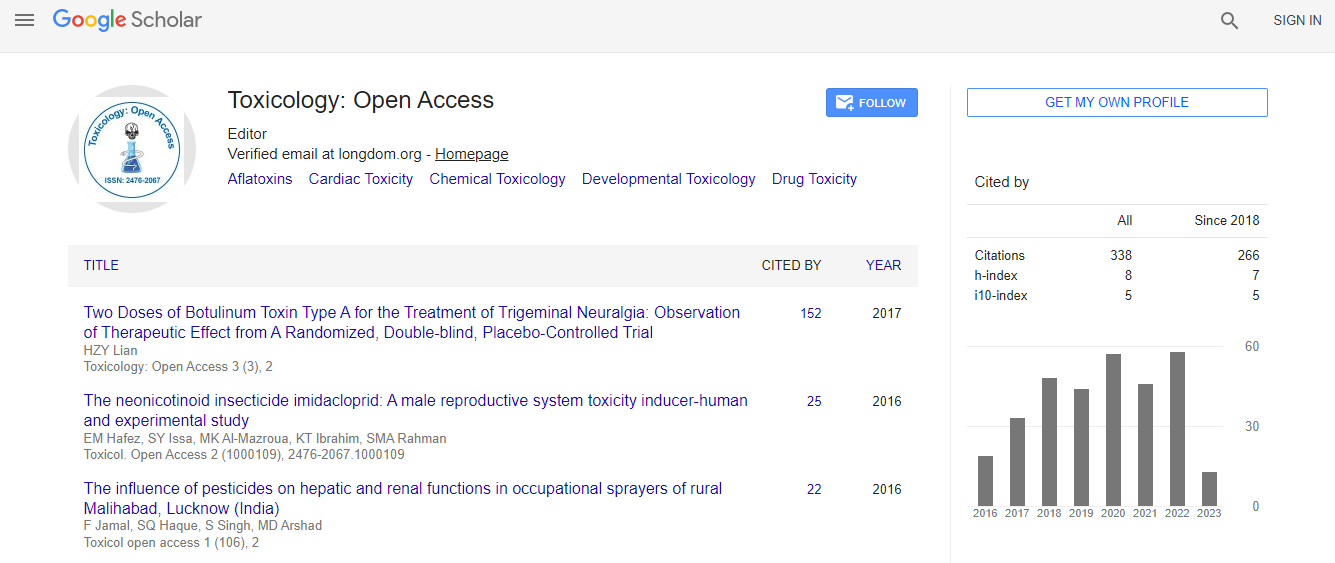Our Group organises 3000+ Global Conferenceseries Events every year across USA, Europe & Asia with support from 1000 more scientific Societies and Publishes 700+ Open Access Journals which contains over 50000 eminent personalities, reputed scientists as editorial board members.
Open Access Journals gaining more Readers and Citations
700 Journals and 15,000,000 Readers Each Journal is getting 25,000+ Readers
Google Scholar citation report
Citations : 336
Toxicology: Open Access received 336 citations as per Google Scholar report
Indexed In
- Google Scholar
- RefSeek
- Hamdard University
- EBSCO A-Z
- Geneva Foundation for Medical Education and Research
- Euro Pub
- ICMJE
Useful Links
Related Subjects
Share This Page
Spinacia oleracea in diet can help control obesity by its regulatory action on appetite
14th World Congress on Toxicology and Pharmacology
Vandana Sanjeev Panda
Mumbai University, India
ScientificTracks Abstracts: Toxicol Open Access
Abstract
Nutrients and gastrointestinal peptide hormones such as cholecystokinin (CCK), GLP-1 and peptide YY are involved in the short term regulation of food intake, which interact with long term regulators such as insulin, leptin and ghrelin to maintain energy homeostasis. Plant foods have been proven to be effective in modifying release of these short term satiety signals which regulate the balance between food intake and energy expenditure to maintain body weight. Spinacia oleracea (spinach) is a green leafy vegetable rich in antioxidant phyto-constituents such as flavonoids, polyphenols, carotenoids and vitamins. The present study evaluates the appetite suppressing effect of a flavonoid rich extract of the spinach leaf (SOE) in rats. Rats were administered SOE (200 mg/kg and 400 mg/kg, p.o) and fluoxetine (6 mg/kg i.p) as a pre-meal for 14 days. Food intake and weight gain was observed daily during the treatment period. Serum levels of the short term satiety signals CCK and glucose were measured on the 7th and 14th days at different time points after start of meal to study the satiety inducing effect of SOE. SOE and fluoxetine treated rats showed a significant reduction in food intake and weight gain when compared with the normal control rats. On the 7th day of treatment, peak CCK levels were reached in 30 min after start of meal in fluoxetine treated rats and in 60 min in the remaining rats. On the 14th day, CCK peaking was observed in 30 min after starting meal in the fluoxetine as well as SOE 400 mg/kg treated rats. Peak glucose levels in all treatment groups were obtained in 60 min after start of feeding on both days of the study. It may be concluded that SOE exhibited a promising appetite suppressing effect by inducing a quicker than normal release of CCK, thus eliciting an early onset of satiety in rats. Recent Publications 1. Naik S R, Panda V S (2009) Evaluation of cardio-protective activity of Ginkgo biloba and Ocimum sanctum in rodents. Alternative Medicine Review; 14(2): 161-171. 2. Naik S R, Panda V S (2007) Antioxidant and hepato-protective effects of Ginkgo biloba phytosomes in carbon tetrachlorideinduced liver injury in rodents. Liver International; 27(3): 393-399.Biography
Vandana Sanjeev Panda has completed her PhD in Pharmacology from Mumbai University, India. Her research for the last few years has changed focus from pure pharmacology to plant drugs and now functional foods where her lab is active in pharmacological evaluation of plant phyto-constituents, bio-molecules and endogenous substances for a variety of biological activities, their mechanistic studies and development of models for these activities. Her major work has been in the area of gastric and hepato-protection, anti-diabetic and cardio-protective activity, and studies on the metabolic syndrome. She has 40+ research papers with 850 citations in high impact factor journals, a number of research awards and scholarships, and industrial projects to her credit. She sits on the Editorial Board of a few journals and is a Reviewer for many reputed journals.
Email:dr.vandana.panda@gmail.com

 Spanish
Spanish  Chinese
Chinese  Russian
Russian  German
German  French
French  Japanese
Japanese  Portuguese
Portuguese  Hindi
Hindi 